
Dr. Frankenstein, as played by Colin Clive in the Universal Pictures, is, relatively speaking, a sympathetic character. Sure, he was driven to madness and obsession, but that’s just because he was a victim of his own genius. Ultimately, we expect him to repent or somehow correct himself. He spends much of his time in the second Frankenstein regretting his madness in the first Frankenstein – and who could blame him? After all, he’s torn between his science and his angelic wife.
Peter Cushing’s Doctor/Baron carries no such baggage. He’s not some promising fellow who’s led astray by his own brilliance. Rather, his whole being is geared towards the dark path. His course is steady and sure. Like Hwang Woo-suk, the Doctor/Baron is not satisfied patching together monster puppies.

If Woo-suk is all show and no science, then the vain Doctor/Baron is all science and no show. Right after the creation of the monster puppy, we see the Baron’s partner excited about sharing the good news with the scientific community.
 Notice the calm in the Doctor/Baron’s demeanor. He has no intention of sharing their breakthrough with others. His purpose from the get-go was to create a man, as cursed and damned as you ever saw. His partner is horrified and refuses to take part, but that doesn’t stop the Doctor/Baron from proceeding, getting parts by hook or crook or sometimes……murder.
Notice the calm in the Doctor/Baron’s demeanor. He has no intention of sharing their breakthrough with others. His purpose from the get-go was to create a man, as cursed and damned as you ever saw. His partner is horrified and refuses to take part, but that doesn’t stop the Doctor/Baron from proceeding, getting parts by hook or crook or sometimes……murder. 
 He was going after that fella’s brain – which brings up a curious oversight. If you were after the professor’s noodle, then why kill him in a way that would smash the skull? Nevertheless, Peter Cushing plays the coldest most ruthless Frankenstein ever. He never frets about what he is doing or what he has done – but he’s always thinking about how to move forward.
He was going after that fella’s brain – which brings up a curious oversight. If you were after the professor’s noodle, then why kill him in a way that would smash the skull? Nevertheless, Peter Cushing plays the coldest most ruthless Frankenstein ever. He never frets about what he is doing or what he has done – but he’s always thinking about how to move forward.
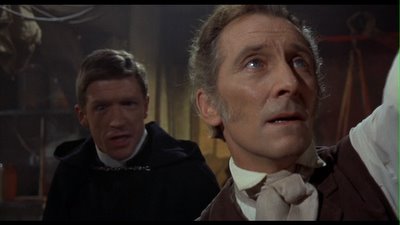 Notice how the local religious authority is outraged and confronting the doctor, yet the doctor is too busy with his work to pay him any mind.
Notice how the local religious authority is outraged and confronting the doctor, yet the doctor is too busy with his work to pay him any mind.
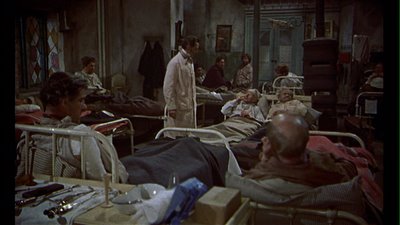 Even when he creates a hospital for the poor in Revenge of Frankenstein, his purpose remains singular – to create another man. The destitute patients merely provide a front for his nefarious activities, as well as a 24 hour pull-o-part.
Even when he creates a hospital for the poor in Revenge of Frankenstein, his purpose remains singular – to create another man. The destitute patients merely provide a front for his nefarious activities, as well as a 24 hour pull-o-part.
When Hammer Studios first planned on making a Frankenstein picture, Universal would not allow them to use it's Karloff styled monster. As a result, The Curse of Frankenstein is a big departure from the Universal brand. If you recall, the Universal monster was quite indestructible. Sure, all the Universal freak stars had their hand at playing him, but it was still the same monster - so much so that it assumed the title name. And some of the conditions in which the monster was destroyed and yet preserved, were pretty horrendous. For instance:
the sulfur pit-

in ice (more than once)- 
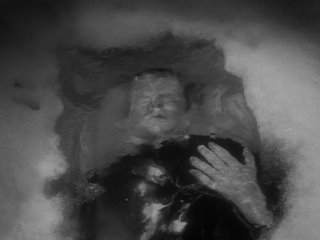
sewage-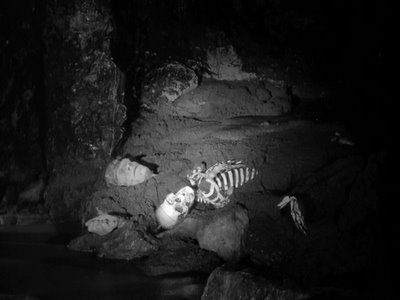
In short, it sucks to be him. In contrast, Peter Cushing works on his monsters like a mechanic works on so many cars:
Remember the classic 57’ Lee with the black top and the variegated eyeballs?
Or the 1969 Pravda with the removable hard top and racing lobotomy scar?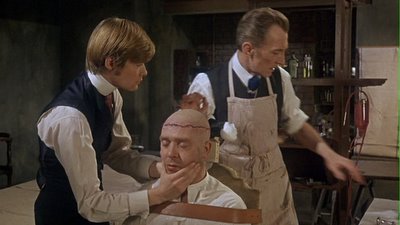
My favorite was the 67’ Denburg with the sexy curves and the 5 liter ta-tas. What a ride!
What a ride!
In the Universal pictures, the monster is the chief menace, even if it is sympathetic. In the Hammer films, the Doctor/Baron is the real bad guy and there’s nothing sympathetic about him. True, the monsters kill a person or two in each of the Hammer films, but Peter Cushing is usually responsible for worse. Terence Fisher more or less reconciled this difference between monster and doctor in the second movie by simply making the Doctor/Baron the monster.
Dr. Frank will see you now.
The one Hammer flick that's the black sheep of the bunch is 1964’s The Evil of Frankenstein. It does not carry on from its Hammer predecessors, but more or less takes up where the 1932 Universal film leaves off – though the story borrows generously from the Son of Frankenstein. Only, with less of Rathbone’s nervousness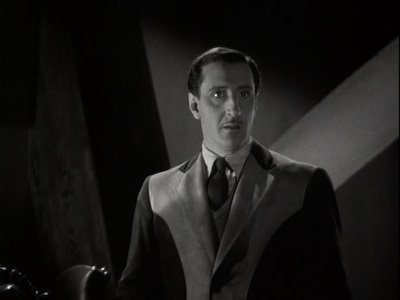
and more of Cushing’s sly confidence. In true Universal fashion, the monster is like a re-heatable snack, recovered, yet again, from the ice. Tupperware is still trying to find the Doctor’s secret. (Incidentally, The Evil of Frankenstein may not be held in high esteem, but there's an excellent sequence when the Doctor/Baron recounts when he first created the monster.)
In true Universal fashion, the monster is like a re-heatable snack, recovered, yet again, from the ice. Tupperware is still trying to find the Doctor’s secret. (Incidentally, The Evil of Frankenstein may not be held in high esteem, but there's an excellent sequence when the Doctor/Baron recounts when he first created the monster.)
But mostly, the Hammer films tend to downplay the supernatural, indestructable elements. In that light, the Doctor/Baron’s meglamania has no larger evil to redeem himself against – making him more controlling and vile than if he had. And Peter Cushing brilliantly seizes on that.

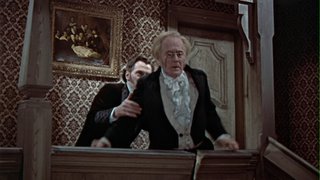









.jpg)






No comments:
Post a Comment